- Home
- Jean R. Ewing
Folly's Reward Page 7
Folly's Reward Read online
Page 7
His opponent outweighed him by at least three stone. Jamie boasted huge slabs of brawn across his chest, and arms built like tree limbs.
Prudence flinched as a mammoth fist swung at the laughing face beneath the black hair, threatening to smash the fine bones into splinters. Yet Hal seemed perfectly relaxed. Without visible effort he ducked away from the blow, then almost casually landed one of his own against the side of the giant’s head.
The crowd roared.
* * *
Ah, so he did know how to box, after all!
Hal danced and spun, ducking and blocking as Jamie came flailing into the attack.
“Come, Jamie,” he said between breaths. “Take another stab, man! I might be annihilated just by the sheer wind of it as it goes past my ear.”
Several heavy blows rained about his head. Hal swirled away from the worst of them, but one great fist caught him hard in the shoulder. For too long his entire right arm was numb to the wrist, but he managed to raise it just enough to block the next incoming attack. With his left he landed another blow of his own.
Jamie staggered back with a look of open, comic surprise on his red face.
“‘He stayed not for brake, and he stopped not for stone, / He swam the Eske river where ford there was none,’” Hal quoted. “‘For a laggard in love, and a dastard in war, / Was to wed the fair Ellen of brave Lochinvar.’”
It seemed appropriate only because the River Eske lay so close. Unfortunately, Jamie seemed to think the verses an insult. He roared like a lion and enthusiastically swung back into the mill.
“‘Love swells like the Solway, but ebbs like its tide,’” Hal added. “‘So faithful in love, and so dauntless in war, There never was knight like the young Lochinvar.’”
Then he had no more breath left for poetry.
For although Jamie was very drunk—more foxed than Hal was, and making more mistakes—the man was a vicious fighter. Hal managed to land several more blows to the man’s chin and chest. But his punches would never knock down this monster, and simple, unforgiving fatigue was taking its toll. Hal’s shoulders had begun a fierce burn, and every reaction came more slowly.
He began to fall back, the crowd surging away behind him, as Jamie came in for the final annihilation. The blows came too quickly now to dodge them all.
“‘And save his good broadsword, he weapon had none.’”
Hal gasped as a fist skimmed past his ear, grazing his cheek, while another landed square in his belly, forcing the air from his lungs in a sickening rush.
He began to fight for his life.
* * *
Prudence hated it. She hated the sense of stupid, animal ferocity, and the dark bruises blossoming like evil flowers on the men’s bodies. She hated the rapacious faces of the crowd, wagering their money on other men’s pain.
Yet against her will she was enthralled. Fascinated by the grace of Hal’s movements, and his cavalier, laughing disregard for the fact that sooner or later the big man would beat him down and destroy him. Fascinated by the strange beauty of his body, dancing in the torchlight. Fascinated by his wide, hard-ridged shoulders and strong, slim waist, flexing and twisting in deadly combat.
Her heart sang at the sheer loveliness of a fit young man, as her soul yearned for his courage in the face of such overwhelming odds.
Before she could quite fathom that it was over, Jamie began to fall.
Hal spun out of his way as the man dropped to his knees. Jamie swung his head back and forth for a moment, like a bull blinded by dust, then thudded to the ground.
The onlookers surged forward, but the giant lay staring vacantly up at the sky.
Hal’s voice floated up to her above the roar of the crowd, ragged with his disordered breathing, but still clear and deadly.
“Alas!” he said. “What sport is this? ‘“She is won! We are gone! Over bank, bush, and scaur; / They’ll have fleet steeds that follow,” quoth young Lochinvar.’”
Still laughing, and glazed with exhaustion, Hal allowed the gentleman with the beaked nose to wrap his shirt around his shoulders and press something into his hand.
Prudence pulled Bobby from the window and sat with him on the bed for several long minutes as she stared out at the night sky.
She felt like weeping and yet she was very angry. Damnation to the beautiful, mysterious Hal!
“You see,” Bobby said. “I said Hal was the stronger. And now will he drive us to Carlisle?”
“With pleasure,” a voice said from the doorway. “The road will soon be cleared. Our nags are rested. We can still arrive in Carlisle before tomorrow.”
“Are you mad?” Prudence whirled around. “What on earth was that about?”
“No, no, angel,” Hal replied, coming into the room. “I have taken enough blows already. Pray do not add to them!”
He had obviously sluiced himself with water. The black hair was damp, and ruffled as if rapidly dried in a towel. A great rent marked one seam of his jacket. He looked like a gypsy—wild and untamed.
Bobby ran up to him. Without visibly wincing, Hal swung the child up into his arms.
“Bed for you, sir!” Hal carried the boy into a small adjoining bedroom and tucked him between the covers.
When he returned, Prudence stood and faced him. She was shaking.
“You must be a wastrel. Or a lunatic. Or a scoundrel.”
“I have wondered as much,” Hal said seriously. A bruise was beginning to color his cheek. “I have no idea, of course. I might be just a man-about-town, who fills his idle hours with pugilism.”
“Is that what you wished to find out?”
He looked straight into her eyes. Prudence saw how carefully his emotions were guarded, emotions that he covered with flippancy and with sarcasm.
“And earlier it seemed as if I must be a rake, didn’t it? Of course, boxing and flirtation are both pursuits of the idle Corinthian as much as of the rogue. So I still might be just a respectable man with a competence.”
“No respectable man would take up a challenge to indulge in drunken fisticuffs. It would go against every instinct.”
“Then I am a disreputable fellow, after all. For of course no respectable man would treat a lady as I have treated you, stealing kisses as if they were his due. Do you think I’m a Don Juan and a profligate?”
“I think it very likely,” Prudence snapped.
Hal dropped to a chair and leaned his head back.
“A challenge?” he asked with a grin. “It seems to me that there is only one way to find out, isn’t there? You must help me discover, Miss Drake, how much of a rake I am. In the meantime, I intend to take you to Carlisle, as promised. For whatever I am—and the delightful state of not knowing is proving most soothing to my soul, I must say—I intend to keep my word.”
Prudence blushed, just a little. “You cannot mean to drive me to Carlisle after this.”
“Why not? I am paid and contracted to do so. Come, let us fetch Bobby and return to our carriage.”
She resented it, but she followed him down the stairs and out into the night, Bobby fast asleep in his arms. Their carriage was waiting.
The famous Eske River was crossed by a bridge. Less than two hours later, they arrived at Carlisle. The George Inn was jammed with passengers just arriving from the south.
Prudence pushed through the crowd, and booked and paid for tickets on the mail coach the next day as far as Liverpool. She secured a room for herself and Bobby for the night.
But before she could either thank him or admonish him again, Hal had disappeared.
* * *
In spite of his burning fatigue, Hal could not sleep. He shared a room in the attic with two other travelers whose snores rumbled into the quiet night. Why the devil had he kissed Prudence Drake? To find out if he was indeed a rake?
She had trembled in his hands like a doe!
It had been strangely delightful, but if he was setting himself up as her knight-errant, he hadn’t exactly made a ver
y good start. But where was she going in such haste with a child who claimed a title? And why did fear travel with her? Finally, lulled by his companion’s snores, Hal drifted into the sleep of deep exhaustion.
He dreamt. There was the voice of a woman. Her words seemed faint and remote. She was arguing with someone: “But he broke into the house!”
Hal heard someone saying her name, someone who meant everything to him—a man he would give his life for, if it were asked. “Helena. Go to bed, Helena.”
And Helena was gazing down at him, her features full of fear and anger, and her blond hair brightly haloed by candlelight.
As he looked up at her, the lovely face wavered and changed, and it was Prudence Drake who stood over him. The expression of distaste on her severe features threatened to break his heart.
“Smile for me, sweet angel,” he heard himself say.
But she turned away from him in disgust.
When he awoke, the other men were gone. Hal dragged himself out of the bed. He shrugged into his shirt and winced as his sore muscles made protest. At least the pugnacious Jamie had broken no bones.
His face looked back at him from the small mirror over the dresser. He surveyed it without pleasure. He was lucky not to have a black eye, for one cheek was marked with a magnificent bruise.
And then as if his dreams continued, he heard his own voice: “How the hell is the family’s name for elegance to be kept up if you will keep appearing in public brindled like a cow?”
Hal went close to the mirror and pushed his untidy hair back from his forehead. He studied the blue eyes and the high cheekbones. So he had a family with a name for elegance? All he vaguely remembered were the names of some children. Who were they? Who was he? Were there men and women out there somewhere who looked like him? Who missed him? Did anyone care that he had disappeared? And who the devil was Helena?
He laughed at himself. Perhaps if he had let Jamie beat him to a pulp, he would have remembered. Isn’t that what usually happened with head injuries in novels? One did the damage, but a second repaired it?
Hal slung on his torn jacket and went downstairs to pick up the horse he had arranged to rent the night before. It was past eight. The Liverpool coach had already left—a discovery he made without asking, because someone else was making the inquiries for him.
From instinct Hal drew back and concealed himself behind a pillar as he heard the man’s voice.
“I’ve been asking at every inn in town, sir. I’m looking for a black-haired fellow traveling south with a woman and a little boy. The lad’s blond and bright for his age. The man is youngish, tall and good-looking, has an air about him. You’d not miss him.”
“The coach south has gone, sir,” the innkeeper said, “these three hours since. There was no party on it that matches your description, although there were four children among the passengers, and one was a blond lad, right enough.”
The man turned away and walked out into the streets of Carlisle. Hal knew he would be easy enough to recognize again. The poor fellow had a scar down the length of his cheek and wore a black patch over one eye.
* * *
Bobby did not weep or throw a tantrum when he realized that they were leaving without Hal, but his stoic silence almost broke Prudence’s heart.
They had left Carlisle at five that morning and had breakfast in Penrith. She stared dully out of the window as the coach climbed up over the heath and across Shap Fells. The famous peaks of the Lake District spread out to her right. Once she had dreamed of being able to wander, ‘lonely as a cloud’, through those famous hills and valleys. Now the coach sped past them, while one of the passengers rattled off the names and quoted long passages from Wordsworth.
Although they were some of her favorite poems, Prudence hardly heard them, for her mind was filled with images of Hal. She had let him kiss her—twice! A man who would strip himself to the waist and fight like a beast for a purse full of guineas. She didn’t know whom she despised most: Hal or herself.
But she had left him behind. She had left him behind!
After a steep descent into Kendal, the coach began to travel through fertile valleys filled with fields and trees. Burton, Lancaster, Preston, Ormskirk, passed in a blur, until at last just before ten o’clock that night they arrived in the coach yard of the Royal Oak in Liverpool, and Prudence discovered that she had no money.
She frantically turned out her pockets and her little collection of luggage, while Bobby helped by keeping up a running commentary on all the extraordinary things he had seen from the coach.
“That lady said those big standing stones we saw past Shap were a Druidical Relique, Miss Drake,” Bobby said earnestly. “What is that? Who were the Druids? And why does the rock change color? It was gray on the fells, and then black, and then red. Why is that? What did that man mean by saying that hill was Arthur’s Round Table? It didn’t look like a table, did it?”
“Hush, Bobby. I am busy.”
All she found were a few shillings in the pocket of her pelisse. The purse of gold was gone. Dear God, help her! She had carried Lady Dunraven’s coins tied securely at her belt. It had been a comforting weight. How could she not have instantly missed it? When had it disappeared?
Prudence sat down on her bag and hugged Bobby to her side. There was no answer. But somewhere, at one of the inns, at Penrith or at Shap or at Lancaster, or even last night at Carlisle after she had paid for her room and passage, someone had stolen her money and she hadn’t even noticed.
Oh, dear Lord, what was she going to do now?
“Come, now, ma’am,” the innkeeper said. “Did you want a room or not?”
“Might I ask for a room on credit, sir?” she asked. “I believe I have been robbed.”
Within three minutes, she and Bobby were standing together on the streets of a strange city, their luggage tossed out behind them, while the dark mist of a Liverpool night wreathed about through the houses.
As if to add color to her plight, it began to rain. Prudence reached into one of her bags and pulled out her umbrella.
“I think, sir,” she said to Bobby. “That we had better find some other kind of shelter.”
“What, angel? Is the Royal Oak not to your taste?”
“Hal!” Bobby squealed.
Prudence lifted her umbrella and saw him standing there, smiling at her. The child launched himself into Hal’s arms.
“Hal, we’ve been robbed and the nasty man at the inn won’t let us stay, and Miss Drake and I have nowhere to go.”
“You’ve been robbed?” Hal asked sharply. “Where? When?”
“I don’t know,” Prudence said. “But I have only a few shillings left to my name.”
“Then thank goodness I won my guineas last night, angel. Come, we’ll at least buy dinner—but not at the Royal Oak, alas. We shall have to conserve our small purse, won’t we?”
Hal shouldered her luggage and strode away down the street, Prudence and Bobby at his heels.
Within a few minutes they were in the dining room of a small, plain hostelry. Bobby ate a large bowl of soup while Hal maintained a light, flippant conversation about hired horses. Finally the child fell asleep on Prudence’s lap.
Hal leaned back and the harebell eyes narrowed between the black lashes as he looked at her.
“Very well,” he said. “I want to know what the devil is going on. I happened to overhear your pursuer asking after you at Carlisle. Why are you fleeing into England with the young Earl of Dunraven? And why are you being followed by a man with an eye-patch?”
Her confused rush of anger and, oddly, relief that Hal knew of her predicament left Prudence breathless for a moment.
“How do you know about Bobby?”
“My dear Miss Drake, Bobby announced his title to the whole world in Gretna Green. A few discreet inquiries gave me the details. Henry, the fourth earl, died in London recently. Bobby is now the fifth Lord Dunraven—small owner of his own vast estates and a castle. Yet you are fly
ing in terror from Scotland and you are being followed. I want to know why.”
Prudence told him: about Lord Belham, about the guardianship, about the threat to Bobby’s life.
“An unlikely tale, angel, don’t you think? Where are you taking him?”
“To my sister in Wiltshire. Her husband’s a magistrate. Bobby will be safe there.”
Hal stared at her, and then he put his head in his hands to hide his reaction—which was close to hilarity.
“Oh, Lord! This is insanity. The whole thing is preposterous. A piece of absolutely perfect folly! You mean to tell me that Lady Dunraven sends her vulnerable little grandson away into England with no protection but his charming, innocent governess—who has never been out of Scotland before—because they are being sought by a lethal marquess?”
Prudence bridled. “I don’t care how foolish it seems. That is what happened.”
“But now you land in Liverpool, robbed of your purse, and with the pursuit hot on your trail. I think, my dear, that I shall have to rescue you.”
“How do I know that I can trust you?” Prudence asked in a small voice. “What payment would you want?”
Hal stood up and walked back and forth for a moment. Then he came back and sat down again opposite her.
“You cannot know that you can trust me, Miss Drake. How can I know whether I can trust myself, when I don’t know who I am? We shall both have to gamble on that. Yet the name of Dunraven has been nagging uncomfortably at my gizzard ever since Gretna, though I have no idea why. So I shall undertake to get you and Bobby to your sister, and we shall throw the man with the eye-patch off our trail.”
“And the payment?”
He grinned playfully. “To put up with my company, of course. The company of a fellow who is probably a rake and a wastrel, and who certainly intends to find out.” He winked at her. “I might take my payment in kisses, I think. Nevertheless, with your few shillings, you don’t have much choice, do you? I shall protect you with my last breath from the fellow with the eye-patch.”
“At least I know that you can knock down a man twice your size.”
“You refer to the elegant Jamie? Alas, angel, I did not knock him down. When the drink finally seized his befuddled brain, he fell like a tree of his own accord. Had he not been foxed, I assure you that you could have left a wreath on my grave in Gretna Green. I hope you would have purchased a large and grand one, full of lilac—for youthful innocence, broken engagements, and sad death. ‘O were my Love yon lilac fair!’”

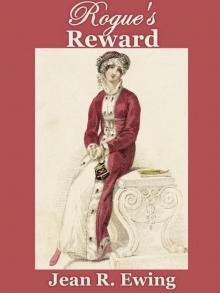 Rogue's Reward
Rogue's Reward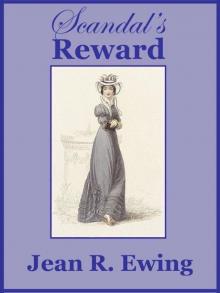 Scandal's Reward
Scandal's Reward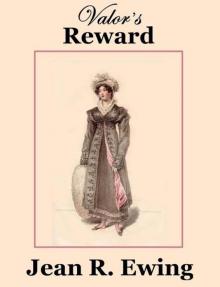 Valor's Reward
Valor's Reward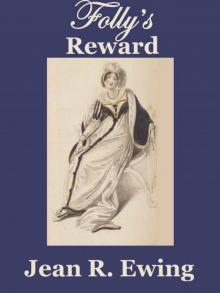 Folly's Reward
Folly's Reward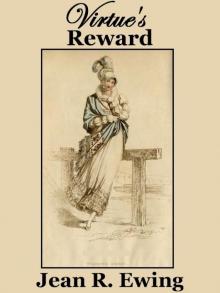 Virtue's Reward
Virtue's Reward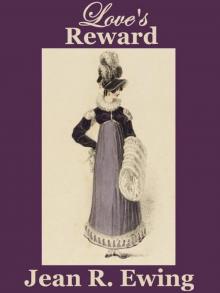 Love's Reward
Love's Reward